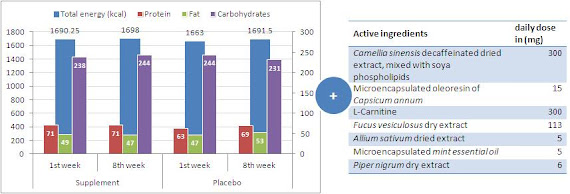Epigallocatechin Gallate (EGCG), Capsaicins, Piperine & Carnitine: Rather a Health Than a Fat Loss Stack?
Simple Truth: The right diet, not the right supplements is the key factor in losing body fat
Apropos reduction in energy intake, one of the most underrated but practically highly relevant beneficial effects the administration of the epigallocatechin gallate (EGCG from green tea), capsaicins, piperine, L-carnitine and a few minor ingredients (see figure 1, left) probably brought about certainly were the psychological benefits, such as the 3.3 pts decrease on the Beck depression inventory (BDI-II), since the ability and will to adhere to a diet - whether this may be for 8 weeks as in the study at hand or (preferably) for life - obviously hinges on the question: "Can you stick to it?"
 |
| Figure 1: Energy content (primary axis in kcal) and macronutrient composition (secondary axis in g) and ingredients of the of the weight loss supplement (Rondanelli. 2012) |
Fat loss or anti-diabesity stack? That is the question!
The combination of a lack of exercise stimuli and a relatively low dietary protein intake (certainly below the threshold limit of 10g+ of EAA per meal) is probably also the main reason for the slight loss in lean muscle tissue, a phenomenon - and that's interesting, although the difference did not reach statistical significance - occured only in the supplemented group.
 |
| Figure 2: Changes in body composition (left) and selected markers of glucose management and fatty acid metabolism, adipokine expression and inflammation (Rondelli. 2012) |
"600g in 8 weeks? Are you kiddin' me?"
Yep, you read me right, 600grams is all the supplement yielded as far as additional fat loss is concerned. That, plus the fact that neither this, nor any of the differences in between the changes in anthropometric data reached significance does tell you something about the actual weight loss effects even obese and insulin resistant subjects can expect from taking an epigallocatechin gallate (EGCG from green tea), capsaicins, piperine and L-carnitine based dietary supplement.
What? That's pathetic? Well, it would be if these changes were not accompanied by way more important and statistically significant different effects on the insulin sensitivity of the 41 overweight subjects in the supplement group who completed the study.
 |
| As far as the inhibition of diet induced weight gain and insulin resistance are concerned, there is no synergism of green tea and the L. plantarum, a probiotic. Green tea does the job, the bacteria stand by and watch in awe (read more) |
You may want to keep that, as well as the (un-)fortunate truth that there simply is no "fat burner pill" on the market that will do the allegedly hard dieting and exercising for you, in mind, whenever you pass by the storeboard with the virtual or real shelves of a supplement store and are tempted to invest 50$ or so into yet another "next generation fat burner"... without having a diet and workout plan and the will to stick to it, you can just as well save the 50$.
References:
- Rondanelli M, Opizzi A, Perna S, Faliva M, Solerte SB, Fioravanti M, Klersy C, Edda C, Maddalena P, Luciano S, Paola C, Emanuela C, Claudia S, Donini LM. Improvement in insulin resistance and favourable changes in plasma inflammatory adipokines after weight loss associated with two months' consumption of a combination of bioactive food ingredients in overweight subjects. Endocrine. 2012 Dec 28. [Epub ahead of print]



